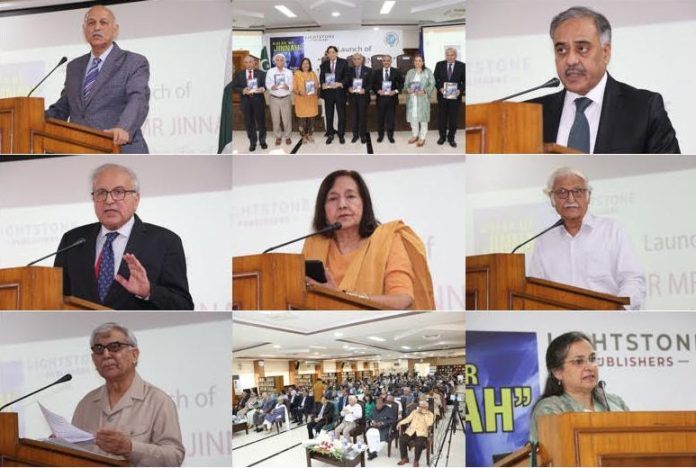ISLAMABAD, JUN 11 /DNA/ – ISSI hosted the launch ceremony of Mr. Salman Faruqui’s book, “Dear Mr Jinnah: 70 Years In The Life Of A Pakistani Civil Servant.” The memoir “Dear Mr. Jinnah” blends Mr. Faruqui’s personal reminiscences with first-hand accounts of developments in Pakistan in different domains from 1947 to 2017. During his long and distinguished career, Mr. Salman Faruqui served in top civil service positions, including as Federal Secretary, Ambassador At Large, Secretary General to the President, Deputy Chairman Planning Commission, and Federal Ombudsman. The discussants and reviewers for the book launch included: Senator Mushahid Hussain; Mrs. Ameena Saiyid, Managing Director Lightstone Publishers; eminent civil servants Mr. Shakil Durrani and Mr. Ejaz Rahim; former Senator Farhatullah Babar; and prominent journalist Ms. Nasim Zehra.
In his welcome remarks, DG ISSI Ambassador Sohail Mahmood highlighted Mr. Salman Faruqui’s illustrious career and his valuable contributions. In his view, three aspects stood out about Mr. Salman Faruqui: his immense professional competence, humility, and wisdom. These attributes were remarkable features for a person whose career had seen tremendous heights and who had spent much time in close proximity to absolute power. In his reckoning, there were many lessons for others in Mr. Faruqui’s life and career.
Ambassador Sohail Mahmood added that Mr. Faruqui’s letter to the father of the nation (contained in the book) is extraordinary in many respects, as it underscores his unshakable belief in the Quaid’s vision of a democratic and progressive Pakistan. He pointed out that the book is neither a history of Pakistan nor a book of revelations about power politics by an insider. Rather, as aptly described by the author himself, it is a “memoir of governance conducted at the edge of a precipice” and the account is rendered, in author’s own reckoning, with “clinical objectivity.” He stressed that the author is not a prophet of doom, but a messenger of hope. He expressed the hope that most people, particularly the youth, would benefit from the experience and wisdom encapsulated in the book.
Mrs. Ameena Saiyid described “Dear Mr. Jinnah” as an outstanding and gripping memoir that showcases the author’s triumphs, struggles, and successes, as well as fascinating anecdotes. Mrs. Saiyid advised that the book is particularly relevant for two groups: students and Pakistanis who struggle to make ends meet. She concluded by proposing that the duty on paper be reduced or waived, making books more accessible and readable for a wider audience.
Senator Mushahid Hussain commenced his remarks by crediting Mrs. Ameena Saiyid for promoting a strong culture of writing and reading, of which Mr. Salman Faruqui’s book represents an esteemed example. Senator Mushahid Hussain termed Mr. Faruqui as a “doer, who delivers,”; someone who served with great distinction throughout his long career in public service. He appreciated Mr. Faruqui’s initiatives, including his work for differently abled people, the actualization of the Gwadar Port with the Singapore Port Authority and China, and his crafting of important social and economic policies supporting Pakistan’s modernization drive. He concluded by appreciating Mr. Faruqui’s book as a memoir of legacy, dedication, commitment, and hard work.
Mr. Shakil Durrani introduced Salman Faruqui as an 8-year-old boy at the time of the partition who took the train from Patiala to Lahore, setting the stage for his remarkable journey. He credited Mr. Faruqui with several initiatives, including the telecommunications revolution in Pakistan and the Benazir Income Support Programme. Mr. Durrani advised Mr. Faruqui to elaborate further on his analysis of significant developments in Pakistan that he personally witnessed such as the March-April 2019 events when Pakistan turned the tide in the fight against terrorism, to provide a more comprehensive understanding of his experiences.
Senator Farhatullah Babar highlighted the salient points of the book and praised Mr. Faruqui’s most notable contribution to the state and society during his tenure as Federal Ombudsman. He also shared his personal experiences with various political leaders, including Mohtarma Benazir Bhutto and President Asif Ali Zardari, and provided his insights on several pivotal events in Pakistan’s history. Senator Babar advised that despite the challenges faced by Pakistan, one should remain hopeful and determined about the country’s future.
Mr. Ejaz Rahim highlighted the central theme of the book as an “exploration” of the various forms of power, including administrative, political, social, institutional, and individual power. He emphasized that with power comes the responsibility to ensure justice and enhance human dignity. He described the book as a “melody” that reflects Mr. Faruqui’s lifelong struggle.
Ms. Nasim Zehra praised the book “Dear Mr. Jinnah” as a highly readable and timely contribution that serves as a reminder for Pakistan to break free from the vicious cycle of past mistakes. In her view, the book is a journey that takes readers from Pakistan’s humble beginnings to its current status, providing valuable insights into the country’s development over the past many decades.
The launch event was attended by a large number of people from different walks of life including civil services, academia, civil society, and the media.

















